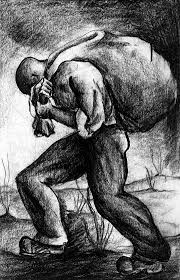inure
英 [ɪnˈjʊər]
美 [ɪnˈjʊr]
- vt. 使…习惯;使…适应
- vi. 适用;起作用;有助于
星级词汇:

记忆方法
1. oper- "work" => Old French: oeuvre, euvre, uevre "work".
2. en "in" + oeuvre, euvre, uevre "work" => ure "work" => inure, enure.
3. => in use or practice or work.
2. en "in" + oeuvre, euvre, uevre "work" => ure "work" => inure, enure.
3. => in use or practice or work.
中文词源
inure 使习惯
in-,进入,使,ure,工作,实践,练习,词源同maneuver,opus.即经常练习,使习惯。
英语词源
- inure (v.)
- early 15c., in ure "in practice," from obsolete ure "work, practice, exercise, use," probably from Old French uevre, oeuvre "work," from Latin opera (see opus). Related: Inured; inuring.
权威例句
- 1. We should inure ourselves to hard life.
- 我们应该使自己习惯艰苦生活.
- 2. One cannot inure oneself altogether to such malicious criticism.
- 谁也不能总是忍受这种恶意批评.
- 3. The inure information reveled, the less profit they can make.
- 信息披露越充分, 潜在投资者的利润越少.
- 4. The one - way ticket between London and Dover will inure from next week.
- 伦敦与多佛间的 单程票 从下周起有效.
- 5. The cease - fire agreement inure from next Monday.
- 停火 协定从下星期一开始生效.
